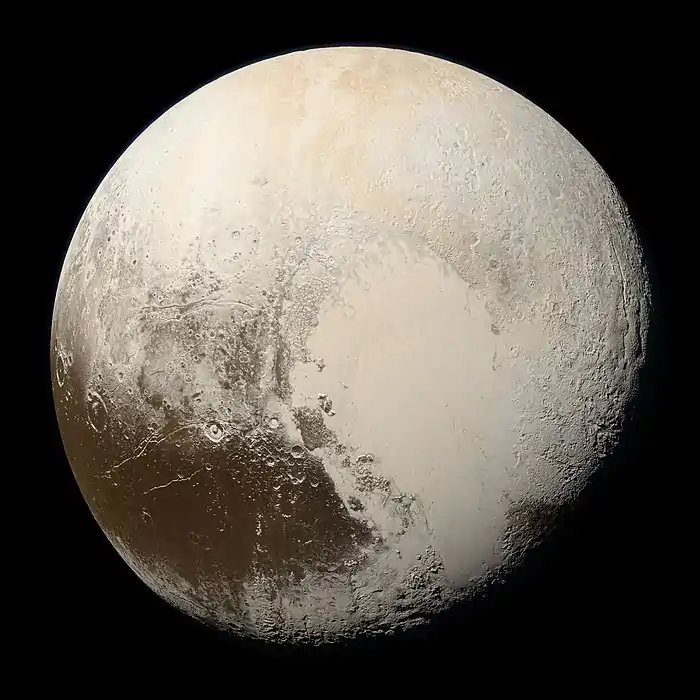Kubrick Mons
Kubrick Mons is the name given to the largest of a series of mountain peaks on Pluto's moon Charon that rise out of depressions in the Vulcan Planum region.[2][3] The feature was first recorded by the Long Range Reconnaissance Imager (LORRI) aboard the New Horizons spacecraft during a flyby on July 15, 2017.
 Kubrick Mons is a depression with a peak in the middle, shown here in the upper left corner of the inset. | |
| Location | Vulcan Planum, on Charon |
|---|---|
| Coordinates | 3.6°N 30.8°E[1] |
| Diameter | 40 kilometres (25 mi) |
| Peak | 3–4 km (1.9–2.5 mi) |
| Eponym | Stanley Kubrick |
Physical description
Kubrick Mons has a diameter of 40 kilometres (25 mi) and is 3–4 kilometres (1.9–2.5 mi) in height.[3] The feature is surrounded by a moat which has a depth of 1–2 kilometres (0.62–1.24 mi) below the surrounding area.[4] It is not currently known how Kubrick Mons formed; however, there is speculation that Kubrick Mons may be a cryovolcano and the depression may be the result of a shrinking chamber of water and ammonia.[3] As of November 2019 this hypothesis remains to be confirmed.
The mountain was named after film director Stanley Kubrick. Official approval of the name was announced by the International Astronomical Union on 11 April 2018.[5] It is sometimes called Charon's Mountain in a Moat or more simply Moat Mountain.
References
- "Kubrick Mons". Gazetteer of Planetary Nomenclature. USGS Astrogeology Research Program.
- "Pluto's Big Moon Charon Has a Bizarre Mountain in a Moat". Space.com. Retrieved 7 October 2015.
- Desch, S.J.; Neveu, M. "Differentiation and Cryovolcanism in the Pluto-Charon System" (PDF). USRA Houston. School of Earth and Space Exploration, Arizona State University. Retrieved 4 October 2016.
- Moore, J. M.; Spenser, J. R.; Mckinnon, W. B.; Beyer, R. A. (Apr 10, 2017). "The Geology of Charon as Revealed by New Horizons". International Asteroids, Comets, Meteors (ACM) Conference 2017. LUNAR AND PLANETARY SCIENCE AND EXPLORATION. Retrieved 3 April 2018.
- "Pluto's Largest Moon, Charon, Gets Its First Official Feature Names". International Astronomical Union. Retrieved 21 February 2019.

